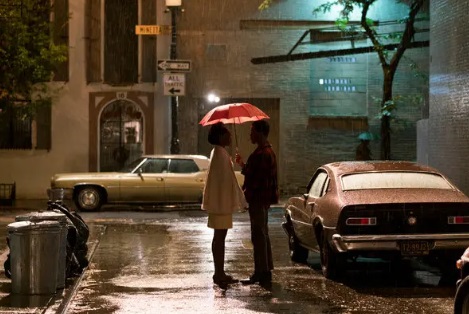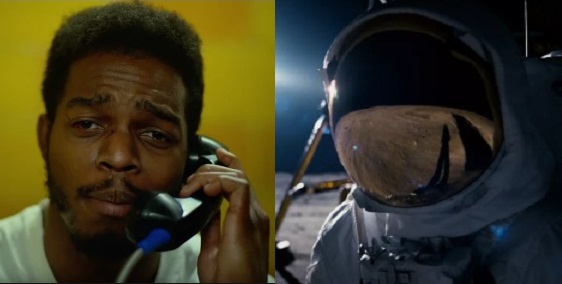“I’m in a glass cage of emotion” — Ron Burgandy
Movies talk to each other. What did the films of 2018 have to say? This is a look at how two movies from the past year tackle similar subjects in different ways. Be warned: SPOILERS for both follow.
A good image is worth reusing. Sometimes it can be a reference incorporated to bolster a new work, like the lengthy homage to Battleship Potemkin‘s Odessa Steps sequence in the criminal justice classic The Naked Gun 33 1/3: The Final Insult. It doesn’t have to be that specific, though. There are plenty of images that have become cinematic shorthand because they work so well, the way a good idiom becomes part of the language. But using them carries a risk as well — a cliche executed badly is disappointing enough, even more so when another work uses it well.
In Damian Chazelle’s First Man, the recurring view of Neil Armstrong is enclosed or behind glass. He’s shut off from others, you see. After Armstrong’s young daughter dies of cancer early on, the American hero weeps uncontrollably in private and then rarely shows emotion for the rest of the movie. Julius’ excellent review lays out how Chazelle uses a shaky, trailing camera when Armstrong is earthbound and emotional, letting the shivering perspective show what Armstrong and actor Ryan Gosling will not. And when Armstrong is not alone, he is often isolated or displaced in the frame.
Whiplash, Chazelle’s breakout film, portrayed a young man so focused on his musical craft that he excludes everything else from his life. It purports to be ambiguous about whether this is a good thing or not, if the sacrifice is worth it, and sets up this dynamic by ignoring the ultimately collaborative nature of the man’s art to create a false dichotomy. He seems to be setting up a similar dynamic in First Man but Armstrong’s blank dedication to his job – which is part of an even greater collaboration than the big band in Whiplash – doesn’t appear to make him a “better” astronaut than his peers, although we do get to see him perform remarkably under pressure in the film’s justly-praised space sequences.

His lack of emotional engagement is questioned not only by his wife, Janet, but his fellow spacemen. He doesn’t engage with anything other than going into space. That could be explored as useful for the bureaucrats running the space program but they are of course portrayed as bean counters who don’t respect the danger Armstrong and his compatriots face. The movie frames that danger awkwardly, unflinchingly depicting the fear and destruction that comes with, in the words of astronaut Mike Massimino, “strapping yourself to the top of a bomb,” but it has little to say about why people would choose to do this. That choice just happens for Armstrong, at the same time thousands of other men without choice were strapped to rifles and dumped into a jungle a world away, and he is as remote to viewers as those men are to this movie. Or as the moon is from earth, and this is the movie’s ultimate aim – to take the viewer on a long journey to the surface of Neil Armstrong, who refuses to make it easy to get to him.
About two-thirds of the way through First Man, Chazelle stages a performance of Gil Scott-Heron’s “Whitey On The Moon” (which was released after the moon landing itself, the climax of the movie). The indictment of spending millions of dollars on rockets while systemic racism oppresses millions of black citizens is one of the occasional breaks away from the perspective of Armstrong, and it has the feel of a checked box – the forced nod to diversity riffed on in the fake American history textbook Dave Barry Slept Here as “women and minority groups were making important contributions” peppered at random intervals in the text. If Beale Street Could Talk, set a few years after Armstrong landed on the moon, does not widen its scope outside the perspectives of its characters (like the winding-down but still running Apollo program), but finds a vast universe all the same.
In Beale Street, the recurring view of co-lead Fonny, a young black man, is enclosed and behind glass. He is in jail awaiting trial for a crime he did not commit, attempting to keep hope that his family and the family of Tish, his newly-pregnant girlfriend, will be able to get him out. It’s a fraught situation, and writer-director Barry Jenkins heightens the emotions in a few ways. One is literary — the increasingly futile meetings between Fonny and Tish are intercut with scenes from their courtship and relationship, making the prison scenes sting with what has been lost and the joyful, sensual interplay between the couple ache with the knowledge of what’s waiting for them (Tish’s narration, from the novel by James Baldwin, offers further foreshadowing). But the other is cinematic, with the camera looking at Fonny and Tish head-on as they address each other, having them address us with love and despair.

Emotions run deep in this story, and instead of compensating for their lack of display Jenkins uses camera (and color and music) to allow the characters express them to their fullest. Sometimes this expression is extremely blunt, as in a funny and savage scene where the two families meet and argue about helping Fonny – the language used would leave marks if actual physical contact had not already done so. But more than blunt, it is full. Full of passion and sadness that Stephan James as Fonny and KiKi Layne as Tish let fill behind their eyes, that pops through a yellow coat, that seeps through seduction in a Miles Davis cut or Nicholas Vitter’s lush score. Every inch of the movie pulses with life and this is Tish’s story of coming to live with all that life can bring.
Jenkins has said that he saw the purity of Fonny and Tish’s love as an indication that Baldwin’s focus was beyond their characters. And the way he realizes it onscreen, without idealizing them or sacrificing their characters, makes it hard to believe there would be any conflict driving them apart, no repressed emotions or technical difficulties. They strap themselves not to a bomb, but to each other. It should be wonderful. What they face is instead is external and probably impossible to overcome – a system that is predicated on harming them.
Fonny is framed by a racist cop for rape, which the movie never implies did not happen – it merely shows that Fonny could not have been the rapist. It’s a cascade of hate and disregard, using an attack on one person to attack another, and when Kiki’s mother tries to talk the woman who was raped into recanting her testimony – coerced by the cop – she can’t revisit her trauma again. Victims are pitted against each other, the winners walk on. Fonny’s court date is pushed further and further back, keeping him in jail for more and more months. Those head-on shots show a man gradually disintegrating, who is being broken like an old friend of Fonny’s who was imprisoned and broken, denied the acknowledgement of a life that exists in vibrant hues because he’s the wrong color. The moon shot of proving Fonny’s innocence fails, he has to take a plea and serve time or go away for life. His life, Tish’s life, the life of the child they created.
The movie ends in prison. Fonny and Tish and their son Alonzo, now a toddler, are at a table during visiting hours. Half of the movie has shown Fonny and Tish looking at and touching each other in the most intimate of ways as they try to live like everyone else. In the other half, they can only look at and touch each other through a glass partition. It’s clearly the latest in many visits that have happened, and the room is full of families. It’s a kind of a life, one where you take what you can because you’re not allowed what’s yours, however much you need it. Fonny and Tish and Alonzo hold hands, while they can.
The final scene of First Man also takes place in a kind of confinement. Armstrong is going through a month of quarantine after returning from the moon, one more withdrawal he has chosen. He and his wife stare at each other through a glass divider, and for the first time Armstrong reaches out. He and Janet press their hands against the glass. Maybe in going to the moon, he found his heart. A connection is made, and he’ll be coming home soon. How nice for him.


